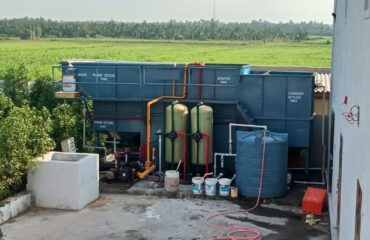Introduction
Pondicherry, a coastal gem nestled on the southeastern coast of India, boasts a unique blend of cultural heritage and natural beauty. In the midst of its charm, the establishment of an Effluent Treatment Plant (ETP) emerges as a crucial step towards preserving its pristine environment. With industries flourishing and urbanization on the rise, the ETP in Pondicherry plays a pivotal role in ensuring sustainable development without compromising nature’s delicate equilibrium.
Understanding ETPs
An Effluent Treatment Plant (ETP) is a technological marvel that focuses on treating and purifying wastewater generated by industrial and urban activities. By employing advanced treatment processes, ETPs work to remove harmful pollutants from wastewater, preventing the contamination of water bodies and fostering environmental well-being.
Significance of ETPs in Pondicherry
1. Environmental Conservation
Pondicherry’s picturesque landscapes and serene beaches are its crowning jewels. ETPs play a vital role in maintaining the beauty of these natural treasures by treating wastewater before it is released into the environment. This proactive approach ensures the purity of water bodies, sustains aquatic ecosystems, and contributes to a cleaner and healthier environment.
2. Public Health Protection
Untreated wastewater contains harmful pathogens and pollutants that can pose serious health risks to the public. ETPs act as a safeguard by treating wastewater effectively, thus ensuring that the community enjoys access to clean and safe water sources.
3. Regulatory Compliance
ETPs play a significant role in assisting industries and urban areas to comply with environmental regulations. They ensure that wastewater is treated to acceptable standards before being discharged into the environment, promoting responsible waste management practices.
4. Resource Conservation
The treated wastewater from ETPs can be repurposed for various non-potable applications, such as irrigation and industrial processes. This reduces the strain on freshwater resources and promotes sustainable water management practices.
Key Components of ETPs
- Preliminary Treatment: This initial stage involves the removal of larger debris and solid particles from the wastewater through processes like screening and sedimentation.
- Primary Treatment: In this phase, suspended solids are further settled and removed from the wastewater through sedimentation tanks.
- Secondary Treatment: Biological processes using microorganisms help break down organic matter present in the wastewater.
- Tertiary Treatment: Advanced methods such as filtration and disinfection are employed to ensure that the water meets high-quality standards before it is released or reused.
- Effluent Reuse or Discharge: The treated water can either be safely discharged into the environment or reused for various purposes, promoting sustainable water use.
Challenges and Solutions
- Awareness Campaigns: Educating industries and the general public about the importance of wastewater treatment and responsible waste disposal practices is crucial for success.
- Technological Advancements: Incorporating cutting-edge technologies can enhance the efficiency and effectiveness of ETPs, leading to better treatment outcomes.
- Collaborative Efforts: Effective waste management requires collaboration among industries, local authorities, and communities to ensure the optimal performance of ETPs.
Conclusion
The establishment of an Effluent Treatment Plant in Pondicherry reflects the city’s commitment to sustainable growth and environmental protection. It serves as a testament to the possibility of achieving harmony between development and nature. As Pondicherry continues to evolve, the ETP stands as a beacon of responsible progress, guiding the journey towards a future where industrial growth coexists harmoniously with the natural world.





